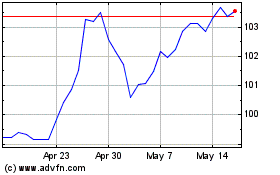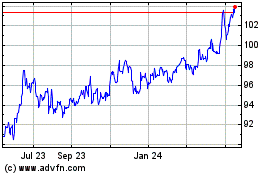Australian Dollar Falls On Weak Retail Sales Data
April 29 2024 - 9:30PM
RTTF2
The Australian dollar weakened against other major currencies in
the Asian session on Tuesday, after data showed that the
Australia's retail sales fell lower-than-expected in March.
Data from the Australian Bureau of Statistics showed that the
total value of retail sales in Australia was down a seasonally
adjusted 0.4 percent on month in March, coming in at A$35.663
billion. That missed forecasts for an increase of 0.2 percent
following the 0.3 percent gain in February.
On a yearly basis, retail sales rose 0.8 percent.
In other economic news, data from the Reserve Bank of Australia
showed that the private sector credit in Australia was up 0.3
percent on month in March, missing forecasts for 0.4 percent and
down from 0.5 percent in February.
On a yearly basis, credit gained 5.1 percent.
Data from Caixin showed that the manufacturing sector in China
continued to expand in April, and at a faster pace, with a
manufacturing PMI score of 51.4. That's up from 51.1 and it moved
further above the boom-or-bust line of 50 that separates expansion
from contraction.
Crude oil prices settled lower amid worries about growth and
outlook for oil demand and the rising possibility of the Federal
Reserve delaying interest rate cuts. West Texas Intermediate Crude
oil futures for June ended down by $1.22 or 1.45 percent at $82.63
a barrel.
Traders cautiously look ahead to the U.S. Fed's monetary policy
announcement on Wednesday after the central bank's preferred
inflation gauge largely met expectations.
The Fed is widely expected to leave interest rates unchanged,
but the accompanying statement and Fed Chair Jerome Powell's
post-meeting press conference may shed additional light on the
outlook for interest rates.
Recent economic data has tamped down expectations of a near-term
rate cut, with the central bank now seen as likely to leave rates
unchanged until at least September.
The Australian dollar traded higher against its major rivals on
Monday amid risk appetite.
In the Asian trading now, the Australian dollar weakened against
other major currencies in the Asian session on Tuesday.
The Australian dollar fell to 4-day lows of 0.6523 against the
U.S. dollar, 1.6403 against the euro and 1.0973 against the NZ
dollar, from yesterday's closing quotes of 0.6561, 1.6332 and
1.0989, respectively. If the aussie extends its downtrend, it is
likely to find support around 0.63 against the greenback, 1.67
against the euro and 1.07 against the kiwi.
Against the yen and the Canadian dollar, the aussie slipped to
102.22 and 0.8930 from Monday's closing quotes of 102.56 and
0.8966, respectively. The aussie may test support near 98.00
against the yen and 0.88 against the loonie.
The other antipodean currency or the New Zealand dollar, also
fell against its most major currencies in the Asian session.
The NZ dollar fell to 4-day lows of 0.5933 against the U.S.
dollar and 1.8034 against the euro, from yesterday's closing quotes
of 0.5970 and 1.7948, respectively. If the kiwi extends its
downtrend, it is likely to find support around 0.57 against the
greenback and 1.82 against the euro.
Against the yen, the kiwi edged down to 92.98 from Monday's
closing value of 93.34. The kiwi may test support near the 91.00
region.
Looking ahead, Germany unemployment data for April and flash GDP
data for the first quarter, the Bank of England's mortgage
approvals data for March and Eurozone flash GDP for the first
quarter and inflation data for April are due to be released in the
European session.
In the New York session, Canada GDP data for April, U.S.
employment cost index for the first quarter, Redbook report, house
price index for February, U.S. Chicago PMI for April, U.S. CB
consumer confidence for April and U.S. Dallas Fed services index
for April are slated for release.
AUD vs Yen (FX:AUDJPY)
Forex Chart
From Dec 2024 to Jan 2025

AUD vs Yen (FX:AUDJPY)
Forex Chart
From Jan 2024 to Jan 2025
